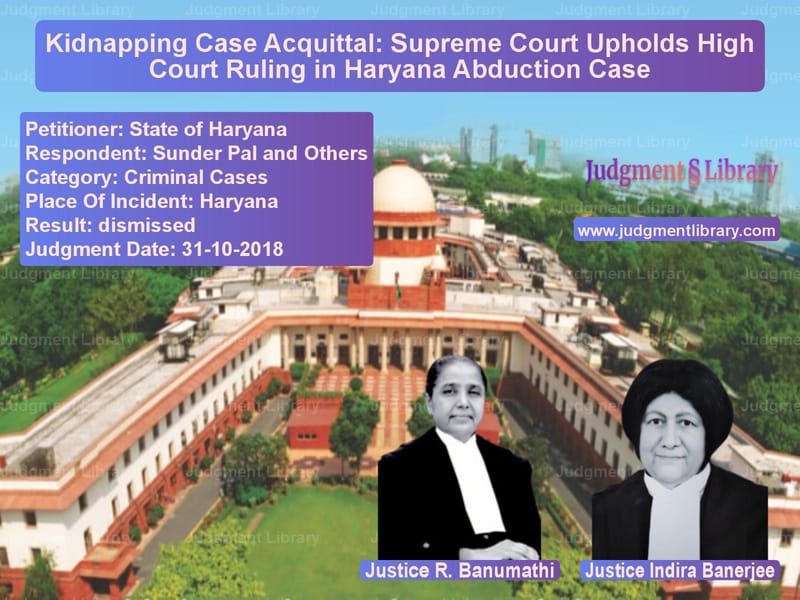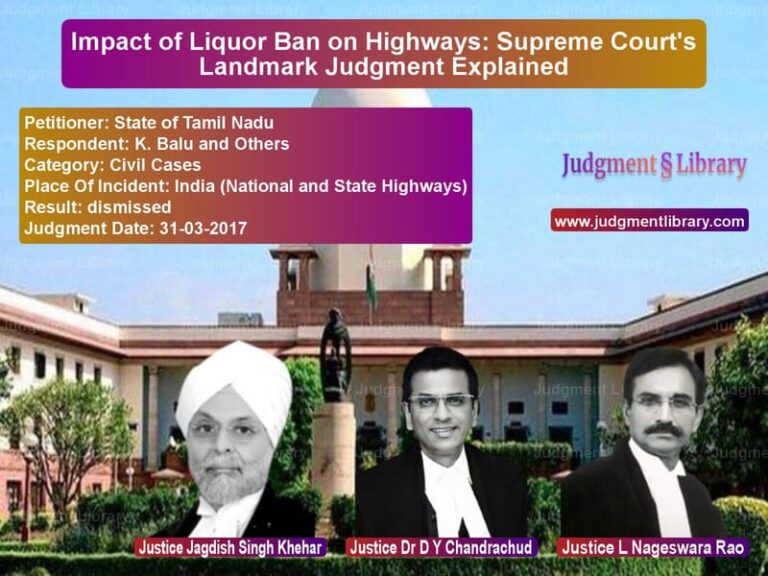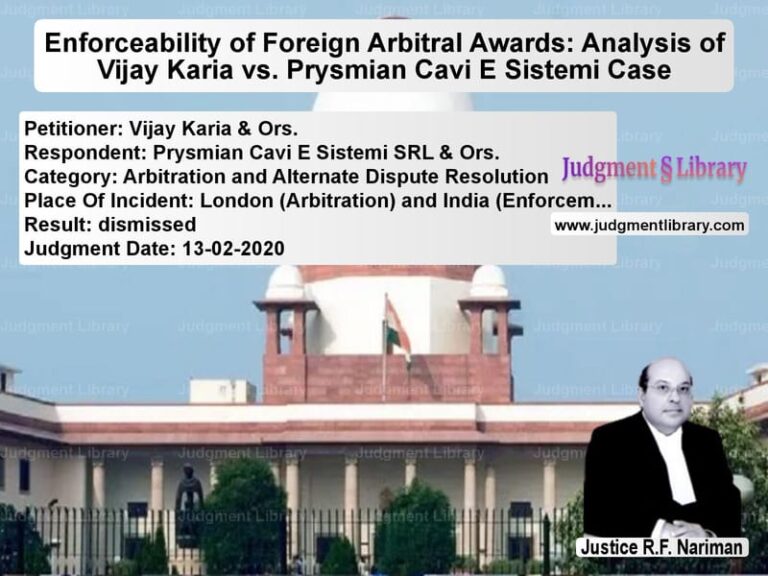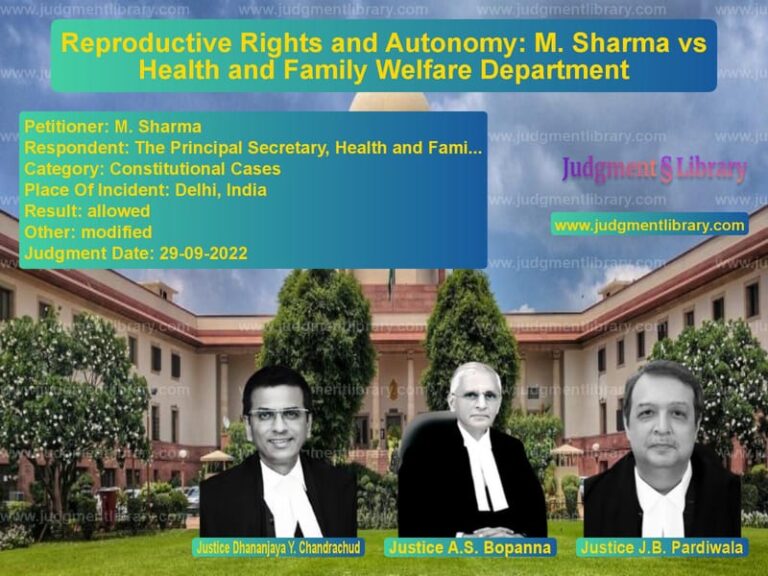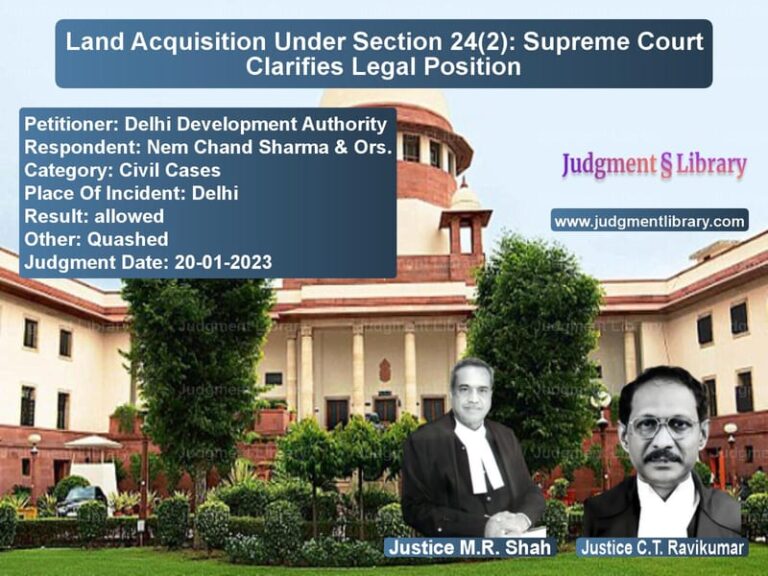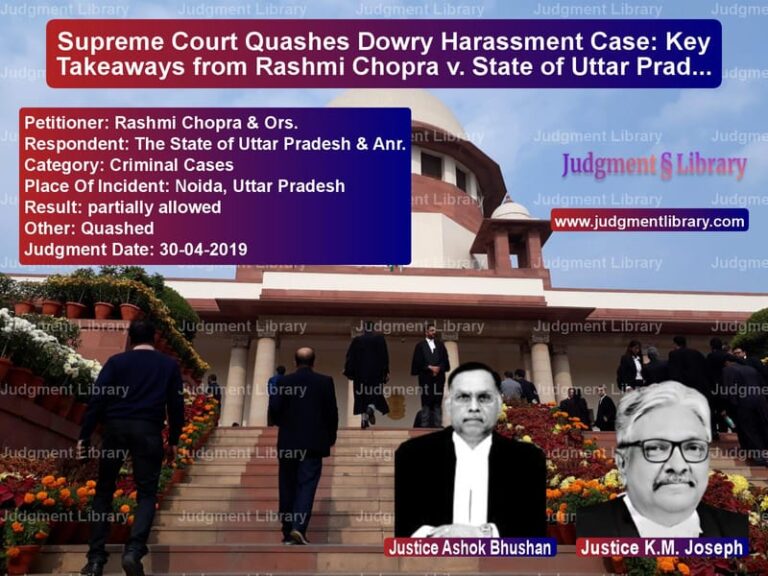Kidnapping Case Acquittal: Supreme Court Upholds High Court Ruling in Haryana Abduction Case
The Supreme Court of India recently ruled on an appeal filed by the State of Haryana challenging the acquittal of several accused persons in a 1996 kidnapping case. The case revolved around the abduction of a nine-year-old child, Amit Kumar, for ransom. The trial court had convicted most of the accused under Section 364-A IPC (kidnapping for ransom) and sentenced them to life imprisonment. However, the High Court overturned the conviction for several accused, leading to the present appeal before the Supreme Court.
Background of the Case
On May 29, 1996, Amit Kumar, son of Madan Mohan, was abducted while he was playing outside. A few days later, on June 2, 1996, one of the accused, Yashpal, approached the child’s father and demanded a ransom of Rs. 10,00,000. The family decided not to report the matter to the police immediately and arranged Rs. 3,50,000. The ransom was paid on June 3, 1996, and the child was released the following day.
The case was later registered, and multiple accused were arrested. The trial court found most of them guilty under Section 364-A IPC and sentenced them to life imprisonment. However, on appeal, the High Court acquitted several of the accused, while upholding the conviction of only two—Vinod and Sohan.
Key Issues Raised
- Did the prosecution establish the role of each accused in the kidnapping?
- Was the High Court justified in acquitting certain accused based on insufficient evidence?
- Did the trial court correctly convict all accused based on the available evidence?
Arguments of the Petitioner (State of Haryana)
- The prosecution argued that Amit Kumar (PW-2), the victim, had clearly testified that he was abducted by Vinod, Sohan, and Virender.
- He was later taken to Sona Arjunpur Railway Station, where he saw other accused—Pawan, Pappu, Jagbir, Sunder Pal, and Vikas—who were allegedly involved in the conspiracy.
- The police recovered part of the ransom money from the accused, and the trial court had rightly convicted them based on this evidence.
- The High Court had erroneously acquitted some of the accused despite their presence at the crime scene.
Arguments of the Respondents (Acquitted Accused)
- The defense argued that there was no direct evidence proving the involvement of several accused.
- Merely being found near the location where the child was temporarily held did not prove their active participation in the kidnapping.
- The High Court correctly noted that only Vinod and Sohan played a direct role in the abduction.
- The prosecution failed to establish beyond a reasonable doubt that the acquitted accused were part of a conspiracy.
Supreme Court’s Analysis
The Supreme Court carefully reviewed the evidence and made the following observations:
- The testimony of Amit Kumar (PW-2) was crucial. He identified Vinod and Sohan as his kidnappers, but his statements regarding the others were inconclusive.
- The presence of some accused at the Sona Arjunpur Railway Station did not necessarily indicate involvement in the crime.
- The High Court’s reasoning that mere presence near the crime scene was insufficient for conviction was valid.
- The prosecution failed to provide conclusive evidence linking the acquitted accused to the abduction and ransom demand.
The Supreme Court cited established legal principles that require criminal convictions to be based on clear and unambiguous evidence. It reaffirmed that:
“Suspicion, no matter how strong, cannot take the place of proof. A conviction must be based on direct evidence or a conclusive chain of circumstantial evidence.”
Final Judgment
The Supreme Court upheld the High Court’s decision and ruled as follows:
- The appeal by the State of Haryana was dismissed.
- The acquittal of the accused—Vikas, Yashpal, Vidya Sagar, Vishav Pal, Pawan Kumar, Sunder Pal, and Jagbir Singh—was confirmed.
- The convictions of Vinod and Sohan were not challenged before the Supreme Court and thus remained upheld.
The Court further noted:
“When the view taken by the High Court is a plausible view and cannot be said to be suffering from any serious infirmity, we do not find any ground warranting interference with the impugned judgment.”
Implications of the Judgment
This ruling has significant implications for criminal law, particularly in cases involving multiple accused in a conspiracy. Key takeaways include:
- Proof Beyond a Reasonable Doubt: Mere presence at a crime scene or suspicion of involvement is not enough for conviction.
- Value of Direct Testimony: The testimony of the victim plays a critical role, but it must be specific and conclusive.
- Role of the High Court: The appellate court has the authority to reassess evidence and overturn wrongful convictions.
- Precedent for Future Cases: The judgment reinforces the principle that guilt must be proven beyond a reasonable doubt.
This case highlights the importance of ensuring that criminal convictions are based on solid and reliable evidence rather than mere conjecture. The Supreme Court’s decision ensures that individuals are not wrongfully convicted due to weak or circumstantial evidence.
Petitioner Name: State of Haryana.Respondent Name: Sunder Pal and Others.Judgment By: Justice R. Banumathi, Justice Indira Banerjee.Place Of Incident: Haryana.Judgment Date: 31-10-2018.
Don’t miss out on the full details! Download the complete judgment in PDF format below and gain valuable insights instantly!
Download Judgment: State of Haryana vs Sunder Pal and Other Supreme Court of India Judgment Dated 31-10-2018.pdf
Direct Downlaod Judgment: Direct downlaod this Judgment
See all petitions in Bail and Anticipatory Bail
See all petitions in Criminal Conspiracy
See all petitions in Extortion and Blackmail
See all petitions in Judgment by R. Banumathi
See all petitions in Judgment by Indira Banerjee
See all petitions in dismissed
See all petitions in supreme court of India judgments October 2018
See all petitions in 2018 judgments
See all posts in Criminal Cases Category
See all allowed petitions in Criminal Cases Category
See all Dismissed petitions in Criminal Cases Category
See all partially allowed petitions in Criminal Cases Category

